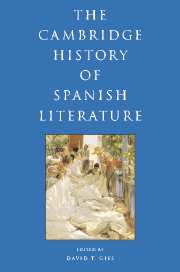Book contents
- Frontmatter
- I INTRODUCTION
- II HISTORY AND CANONICITY
- III THE MEDIEVAL PERIOD
- IV EARLY MODERN SPAIN: RENAISSANCE AND BAROQUE
- V THE ENLIGHTENMENT AND NEOCLASSICISM
- VI THE FORGING OF A NATION: THE NINETEENTH CENTURY
- VII THE MODERN, MODERNISMO, AND THE TURN OF THE CENTURY
- 32 Nineteenth-century women writers
- 33 The Catalan Renaixença
- 34 Great masters of Spanish Modernism
- 35 The poetry of Modernismo in Spain
- 36 Modernism in Catalonia
- 37 Modernist narrative in the 1920s
- 38 Noucentisme
- 39 Ideas, aesthetics, historical studies
- 40 The Catalan Avant-Garde
- VIII TWENTIETH-CENTURY SPAIN AND THE CIVIL WAR
- IX IN AND OUT OF FRANCO SPAIN
- X POST-FRANCO SPANISH LITERATURE AND FILM
- Bibliography
- Index
- References
36 - Modernism in Catalonia
from VII - THE MODERN, MODERNISMO, AND THE TURN OF THE CENTURY
Published online by Cambridge University Press: 28 March 2008
- Frontmatter
- I INTRODUCTION
- II HISTORY AND CANONICITY
- III THE MEDIEVAL PERIOD
- IV EARLY MODERN SPAIN: RENAISSANCE AND BAROQUE
- V THE ENLIGHTENMENT AND NEOCLASSICISM
- VI THE FORGING OF A NATION: THE NINETEENTH CENTURY
- VII THE MODERN, MODERNISMO, AND THE TURN OF THE CENTURY
- 32 Nineteenth-century women writers
- 33 The Catalan Renaixença
- 34 Great masters of Spanish Modernism
- 35 The poetry of Modernismo in Spain
- 36 Modernism in Catalonia
- 37 Modernist narrative in the 1920s
- 38 Noucentisme
- 39 Ideas, aesthetics, historical studies
- 40 The Catalan Avant-Garde
- VIII TWENTIETH-CENTURY SPAIN AND THE CIVIL WAR
- IX IN AND OUT OF FRANCO SPAIN
- X POST-FRANCO SPANISH LITERATURE AND FILM
- Bibliography
- Index
- References
Summary
If modernization can be defined as the differentiation of autonomous life spheres within society, then Modernism can be seen as a late phase of this process characterized by the emergence of an autonomous cultural sphere. The appearance of “culture” presupposed the existence of a market for art and literary products and an advanced division of labor that included the specialization of criticism as a distinct literary function. Modernism, in this sense, hardly applies to turn-of-the-century Catalan literature, or to Spanish literature for that matter. Whereas “high” Modernism was an aspect of the imperialism of the most advanced nations, Catalan Modernisme was a modest but highly interesting manifestation of a society in the throes of national birth. Modernisme is best understood as a liminal moment between the Renaixença, a movement of cultural salvage tied to the emergence of a politically articulate national identity, and Noucentisme, an aesthetic–civic movement which, among other things, consecrated the intellectual’s public role. Its temporal limits could well be set, following Ràfols, between 1890 – the year of the joint exhibition in the Sala Parés of Barcelona by the painters Ramon Casas (1866–1932) and Santiago Rusiñol (1861–1931) together with the sculptor Enric Clarasó (1857–1941) – and 1911 – the year when the poet Joan Maragall (1860–1911) died. Alternatively, Modernisme could be dated from 1888, the year of the first Universal Exposition in Barcelona. Thisb year also marked the start of the second period of L’Avenç (“Forward,” 1881–1893). Conceived originally as a sequel to Valentí Almirall’s Diari Català (“Catalan Daily,” 1879–1881), L’Avenç became, from 1888 until its closure in 1893, the prototypically modernista journal.
- Type
- Chapter
- Information
- The Cambridge History of Spanish Literature , pp. 513 - 519Publisher: Cambridge University PressPrint publication year: 2005



